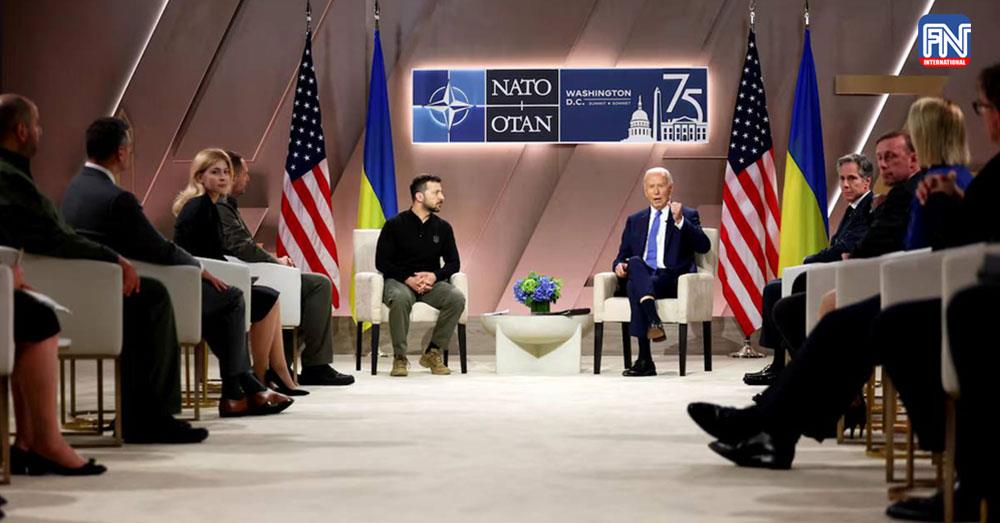WASHINGTON, July 11 (Reuters) - Ukraine on Thursday urged NATO allies to lift restrictions on its use of long-range weapons against targets in Russia, saying that would be "game-changer" in its war with Moscow, while China slammed NATO criticism of its support for Russia as biased and malicious.
NATO members issued a declaration in support of Ukraineat a summit in Washington on Wednesday, promising additional aid and pledging to back its "irreversible path" to NATO membership.
"At this summit we are turning a corner and putting in place the foundations for Ukraine to prevail," NATO Secretary General Jens Stoltenberg told a news conference after a three-day meeting in Washington of the 32 NATO states.
"Today, we send a strong message of unity and resolve to Moscow that violence and intimidation do not pay, and that Ukraine can count on NATO now for the long haul."
Near the end of the summit on Thursday, U.S. President Joe Biden mistakenly referred to Ukrainian President Volodymyr Zelenskiy as "President Putin," before correcting himself, in a mix up likely to add fuel to calls for him to quit the 2024 presidential race.
In a press conference shortly after, Biden made another verbal slip, referring to Vice President Kamala Harris as "Vice President Trump."
Zelenskiy earlier called on allies to preserve their unified support of Ukraine and said new aid had to be delivered quickly.
"If we want to win, if we want to prevail, to save our country and to defend it, we need to lift all the limitations," he said.
Zelenskiy's cabinet chief Andryi Yermak told a public forum Russia had no restrictions on its use of weapons and it would be "a real game-changer" if Ukraine's allies could lift all limits on the use of those they supply to Ukraine.
NATO members have taken different approaches to how Ukraine can use weapons they donate. Some have made clear Kyiv can use them to strike targets deep inside Russia while the United States has taken a narrower approach, allowing its weapons to be used only just inside Russia's border against targets supporting Russian military operations in Ukraine.
Biden told the press conference the United States had allowed Zelenskiy to use American weapons in a limited way within Russia's borders.
"If he had the ability to strike Moscow, strike the Kremlin, would that make sense? It wouldn't," he added.
Biden said he and U.S. military and intelligence officials were making decisions on "a day-to-day basis on how far they should go in. That's a logical thing to do."
The United States and its allies have used this week's summit to try to project unity in the face of what they see as a rising threat to Europe from Russia and China.
However, NATO member Hungary said ahead of a meeting of NATO members with partners from the so-called Indo-Pacific Four - Australia, Japan, New Zealand and South Korea - that it does not want NATO to become an "anti-China" bloc, and will not support it doing so.
Hungary's Foreign Minister Peter Szijjarto also told Hungarian state television that Ukraine's admission to the military alliance would weaken unity in the group.
Hungarian Prime Minister Viktor Orban irked other NATO members with surprise visits to Kyiv, Moscow and Beijing in the past two weeks on a self-styled "peace mission". He and Republican presidential candidate Donald Trump will meet on Thursday at the latter's Florida home, according to three people with knowledge of the matter.
Orban's meeting in Moscow with Russian President Vladimir Putin in particular angered some fellow NATO allies, who said the trip handed legitimacy to Putin's claims to Ukrainian territory seized since Russia's 2022 invasion.
Biden's national security adviser, Jake Sullivan, told a public forum he would not speculate on whether Orban's trip to Moscow was coordinated with Trump, Biden's rival in the November U.S. election, but said the Ukrainians had grave misgivings about any effort to negotiate a peace deal without them.
"So whatever adventurism is being undertaken without Ukraine's consent or support is not something that's consistent with our policy, the foreign policy of the United States," he said.

Photo from Reuters